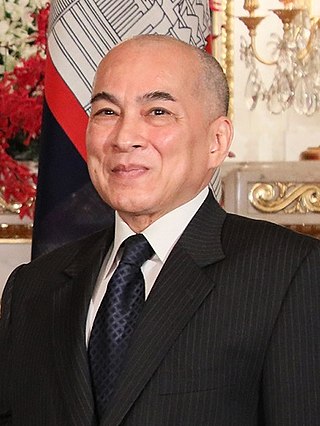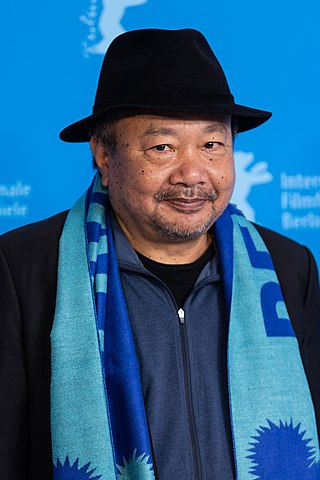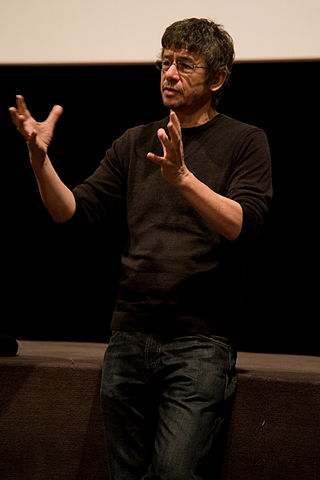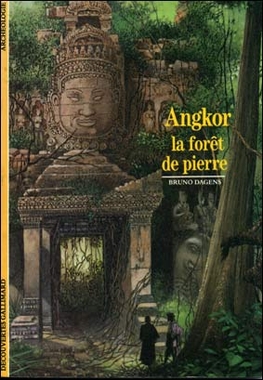Related Research Articles

The post-Angkor period of Cambodia, also called the Middle Period, refers to the historical era from the early 15th century to 1863, the beginning of the French protectorate of Cambodia. As reliable sources are very rare, a defensible and conclusive explanation that relates to concrete events that manifest the decline of the Khmer Empire, recognised unanimously by the scientific community, has so far not been produced. However, most modern historians have approached a consensus in which several distinct and gradual changes of religious, dynastic, administrative and military nature, environmental problems and ecological imbalance coincided with shifts of power in Indochina and must all be taken into account to make an interpretation. In recent years scholars' focus has shifted increasingly towards human–environment interactions and the ecological consequences, including natural disasters, such as flooding and droughts.
Articles related to Cambodia and Cambodian culture include:

Norodom Sihamoni is King of Cambodia. He became King on 14 October 2004, a week after the abdication of his father, Norodom Sihanouk.

Sanjay Kak is an Indian author, activist and self-taught film-maker. He is known for his documentaries about environmental activism and resistance politics.

The Tribeca Festival is an annual film festival organized by Tribeca Productions. It takes place each spring in New York City, showcasing a diverse selection of film, episodic, talks, music, games, art, and immersive programming. Tribeca was founded by Robert De Niro, Jane Rosenthal, and Craig Hatkoff in 2002 to spur the economic and cultural revitalization of Lower Manhattan following the September 11 attacks on the World Trade Center. Until 2020, the festival was known as the Tribeca Film Festival.
António da Madalena was a Portuguese Capuchin friar who was the first Western visitor to Angkor in 1586.

Rithy Panh is a Cambodian documentary film director and screenwriter.

Cinema in Cambodia began in the 1950s, and many films were being screened in theaters throughout the country by the 1960s, which are regarded as the "golden age". After a near-disappearance during the Khmer Rouge regime, competition from video and television has meant that the Cambodian film industry is a small one.
Monkey Dance is a 2004 documentary film by Julie Mallozzi, a filmmaker based in Boston. The film follows three Cambodian-American teens growing up in Lowell, Massachusetts as they face the challenges of urban America, learn from traditional culture and dance, and reflect on the sacrifices of their parents, survivors of the Khmer Rouge.

Siem Reap is the second-largest city of Cambodia, as well as the capital and largest city of Siem Reap Province in northwestern Cambodia.

Soth Polin is a famous Cambodian writer. He was born in the hamlet of Chroy Thmar, Kampong Siem District, Kampong Cham Province, Cambodia. His maternal great-grandfather was the poet Nou Kan. He grew up speaking both French and Khmer. Throughout his youth, he immersed himself in the classical literature of Cambodia and, at the same time, the literature and philosophy of the West.

Paper Cannot Wrap Up Embers is a 2007 French-Cambodian documentary film directed by Rithy Panh.

Philippe Grandrieux is a French film director and screenwriter.
Détour De Seta is a 2004 documentary film directed by Salvo Cuccia about Vittorio De Seta.
A Journal of Insomnia is a 2013 web documentary about insomnia, produced by Hugues Sweeney and created by Bruno Choiniere, Philippe Lambert, Thibaut Duverneix and Guillaume Braun for the National Film Board of Canada (NFB). The production had its premiere on April 18, 2013, as part of the Tribeca Film Festival's first Storyscapes section for transmedia.

The Storm Makers is a 2014 documentary film directed by Guillaume Suon about human trafficking in Cambodia. The term "Storm Makers" refers to the traffickers and the damage they inflict on villages and families. One such trafficker shown in the film claims he has sold more than 500 Cambodian girls, some as young as 14.

For the Love of Spock is a 2016 American documentary film about actor Leonard Nimoy produced by 455 Films and directed by his son Adam Nimoy, who started it before his father's death, at the age of 83, on February 27, 2015.

Chéries-Chéris is an annual international LGBT film festival held in Paris in October or November. Original titled "Festival of Gays and Lesbians of Paris", it was founded in 1994 by Yann Beauvais, Philip Brooks, Élisabeth Lebovici, and Nathalie Magnan. The festival is supported by the Ministry of Culture and the Direction régionale des affaires culturelles of Île-de-France.
Bruno Dagens is a French archaeologist, art historian, Sanskritist, and a specialist on Angkor Wat. He is currently a professor emeritus of the University of Sorbonne Nouvelle Paris 3.

Angkor: Heart of an Asian Empire is a 1989 illustrated monograph on the archaeology and rediscovery of Angkor Wat. Written by the French archaeologist and art historian, Bruno Dagens, and published in pocket format by Éditions Gallimard as the 64th volume in their "Découvertes" collection. The book was adapted into a documentary film with the same title in 2002.
References
- ↑ "The People of Angkor | 2004 Tribeca Festival". Tribeca. Retrieved 2024-01-16.
- ↑ Tertrais, Hugues (2008). Angkor VIIIe-XXIe siècle: mémoire et identité khmères (in French). Autrement. ISBN 978-2-7467-1076-4.
- ↑ Trafic (in French). P.O.L. 2006.
- ↑ Les inrockuptibles (in French). Editions Indépendantes. 2004.